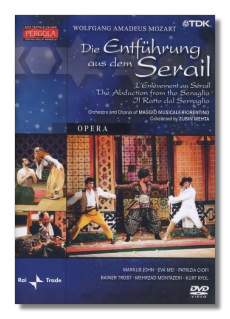
The Internet's Premier Classical Music Source
Related Links
- Mozart Reviews
- Latest Reviews
- More Reviews
-
By Composer
-
Collections
DVD & Blu-ray
Books
Concert Reviews
Articles/Interviews
Software
Audio
Search Amazon
Recommended Links
Site News
 DVD Review
DVD Review
Wolfgang Mozart

The Abduction from the Seraglio
- Eva Mei (Konstanze)
- Rainer Trost (Belmonte)
- Patrizia Ciofi (Blonde)
- Mehrzad Montazeri (Pedrillo)
- Kurt Rydl (Osmin)
- Markus John (Bassa Selim)
Orchestra & Chorus of the Maggio Musicale Fiorentino/Zubin Mehta
TDK DVUS-OPEADS DVD 136m
Filmed live at the Teatro della Pergola, Florence, in May 2002, here's an Abduction one can easily live with, even if one might disagree with some of its details. Scenically, the production is vividly colored eye-candy, and its musical values, while not unforgettable, are certainly high enough to encourage return visits to the seraglio! Most importantly, the production team has remembered that this is a comedy with a heart. We laugh, but we also remember that real human issues – hopeless despair, jealousy, revenge, and forgiveness – arise in this Singspiel. It is not too far-fetched to see in Abduction a foretaste of Beethoven's Fidelio.
It is traditional to make cuts in this opera, not just in the German dialogue but in the musical numbers as well. I won't claim that this is an absolutely uncut production, but it is significantly more complete than any I've heard or seen in the recent past. Because the dialogue usually is one of the first things to be trimmed, Bassa Selim (a speaking role) has the most to gain from the MMF's generosity. For once, this character is more than just a cipher, and Markus John's multidimensional portrayal of the Bassa is the icing on that cake.
One temporarily forgets that we're not in the middle of a Golden Age of Mozart vocalism with a cast this appealing. Savvy acting compensates for singing that's occasionally less than ideal. Eva Mei has a brilliant voice, and "Martern aller Arten" doesn't terrify her. At the end of the day, though, one wishes for more vocal personality and warmth. Similarly, Rainer Trost, while a bit monochromatic, suffers mostly in comparison to Belmontes who have preceded him – for example, Fritz Wunderlich. It's the secondary pair of lovers that makes the more permanent impression. Vivacious Patrizia Ciofi gets deservedly noisy applause for her "Welche Wonne, welche Lust," and Pedrillo's "Frisch zum Kampfe" is thrillingly trumpeted out by Mehrzad Montazeri. Possibly best of all is Kurt Rydl's Osmin, comical and threatening in the right proportions, and zestfully sung, even if he doesn't have the cavernous low notes one ideally wants in "O, wie will ich triumphieren." I shouldn't forget to mention the crocodile (!), a witty bit of stagecraft that makes its presence felt throughout. No doubt Mozart would have written an aria for him (her?) too, had he thought of it! Mehta keeps a low profile, faithfully presenting Mozart's score without putting any special spin on it.
Inexplicably, the camera sometimes cuts to Mehta, even when characters are singing on stage, and there are a few unsteady (and pointless) shots from the back of the theater. Otherwise, the cameras are pretty much where they need to be. The image (16:9 aspect ratio) and sound (stereo, Digital 5.1, and DTS 5.1) are superior. English subtitles, a weak spot for TDK, are better than they have been in the past, but there are misspellings and solecisms. (At one point, the translators forget themselves, and the subtitles revert to German!)
Copyright © 2003, Raymond Tuttle


















